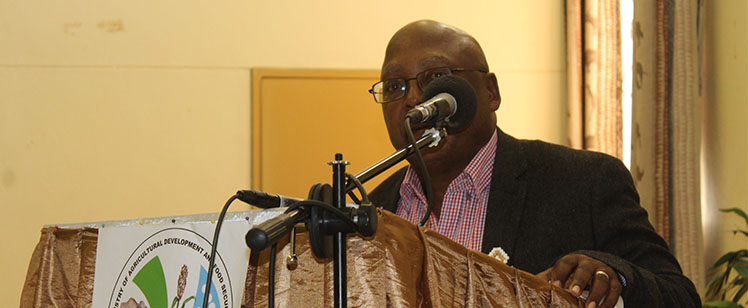-
NFTRC meets Botswana Farmers in Ghanzi
NFTRC recently exhibited at Ghanzi Agricultural Pitso; the Pitso, which was called by the Ministry of Agricultural Development and Food Security (MoA), was held under the theme “Agriculture, a smart alternative to economic diversification”.
The event was attended by farmers from different farmers associations such as Botswana Diary Association, Botswana Horticultural Council, Small Stock Industry Federation of Botswana, Botswana Poultry Association, Botswana Commercial Crop Producers Association and many more.
In his remarks, the Assistant Minister of Agricultural Development and Food Security Mr Frans Van Der Westhuizen said the government is committed to helping farmers. He added that all stakeholders must work hand in hand and come up with long-term plans for making Botswana food-sufficient.

Assistant Minister of Agricultural Development and Food Security Mr Frans Van Der Westhuizen
When giving the Keynote address, Barclays Bank Botswana Business Banking Director, Mr Andre Potgieter started by congratulating the forum, saying that stakeholder engagement is key and unavoidable for conceptualisation, development and implementation in every field or sector of the economy.
Mr Potgieter said the country’s nominal food bill rose from P4.9 billion in 2010 to P7.4 billion in 2017. “The high dependence on imports does not only make the country’ food security fragile, but makes Botswana susceptible to exogenous shocks that have negative impact on food production,” he said.
He said that Agriculture has the potential to solve youth unemployment, therefore there is a need to identify alternatives or opportunities, and also to transform or modernise farming and make it more appealing to potential young farmers. He encouraged the farmers to look beyond their challenges, and instead turn them into opportunities to achieve maximum benefits. He informed the audience that last year Ghanzi farmers had produced 850 tonnes, while this year they produced more than 5000 tonnes.
Furthermore, he noted that the district’s agricultural landscape had evolved from livestock production to irrigated agriculture. “The district also produces tomatoes and onions, and the land put under irrigation had increased from just below five hectares in 2013 to about 200 hectares in 2016”, he said.
NFTRC presented on Food Safety issues, Botswana Unified Revenues (BURS) discussed taxation in Agriculture, and the Department of Veterinary Services highlighted issues of anti-microbial resistance, while the Department of Waste Management and Pollution Control briefed the farmers on waste management in agricultural production areas.

NFTRC Public Relations officer Ms Kelebogile Mafoko(left) interacting with clients
When addressing farmers NFTRC Acting Managing Director Dr Martin Kebakile said that it is high time farmers took the responsibility of the safety aspect of their produce. He shared the findings of the two NFTRC Food Safety projects, “Pesticide Residues in Horticultural Products in Botswana” and “Mycotoxin Contamination of Botswana’s Grains and Seeds”.
He highlighted that pesticide residues have been found in horticultural products in Botswana, while mycotoxins have been found in food grains. He revealed that pesticide residues were due to bad farm practices such as not observing intervals between spraying and supply periods for their produce, while presence of mycotoxins was due to harvesting too late or after rains, as well as bad storage conditions. Dr Kebakile requested the farmers to protect the safety of their produce right from the farm, to the consumer.
Contaminants such as heavy metals and DDT were found in horticultural produce, while fungicides and mycotoxins had been found in food grains in Botswana. He highlighted that all these are bad for both human and animal lives, as they pose a health hazard to them.
During the three-day Pitso, there were various activities such as visits to projects, presentations and group discussions. Resolutions were drafted, to be handed to the Ministry for further interrogation, and implementation if permitted.

The four projects toured were Integrated Farm – where Mr Doecks Rothmann rears small stock and also grows root crops such as potatoes and onions. Another one was on organic farming, where Mr Patel Bharesh produces organic spinach and rape to supply Ghanzi Choppies Store and other supermarkets. The group also toured Tlhokomela Chicken Farm, where they breed almost 5000 chickens in six weeks, and supply chain stores in Ghanzi, Maun and Gaborone. Last but not least was touring Silver Horizons’ field, where almost 85 hectares of potatoes are planted per season. The company hires almost 160 people, and supplies its produce to big chain stores such as Spar and Choppies, countrywide.
All the Pitso attendants who toured Silver Horizons’ potatoes field received a token of appreciation for the visit – each person touring the farm was given one bag of potatoes.
- mail@naftec.org
- Staff Webmail
- NFTRC Library
- Contact Us
